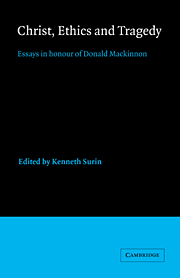Book contents
- Frontmatter
- Contents
- Preface
- Donald MacKinnon
- 1 Theological rhetoric and moral passion in the light of MacKinnon's ‘Barth’
- 2 Idealism and realism: an old controversy dissolved
- 3 Modes of representation and likeness to God
- 4 MacKinnon and the parables
- 5 Trinity and ontology
- 6 Some aspects of the ‘grammar’ of ‘incarnation’ and ‘kenosis’: reflections prompted by the writings of Donald MacKinnon
- 7 Tragedy and atonement
- 8 MacKinnon and the problem of evil
- 9 Pride and international relations
- 10 ‘Between purgation and illumination’: a critique of the theology of right
- 11 On being ‘placed’ by John Milbank: a response
- Index of names
- Index of subjects
6 - Some aspects of the ‘grammar’ of ‘incarnation’ and ‘kenosis’: reflections prompted by the writings of Donald MacKinnon
Published online by Cambridge University Press: 11 March 2010
- Frontmatter
- Contents
- Preface
- Donald MacKinnon
- 1 Theological rhetoric and moral passion in the light of MacKinnon's ‘Barth’
- 2 Idealism and realism: an old controversy dissolved
- 3 Modes of representation and likeness to God
- 4 MacKinnon and the parables
- 5 Trinity and ontology
- 6 Some aspects of the ‘grammar’ of ‘incarnation’ and ‘kenosis’: reflections prompted by the writings of Donald MacKinnon
- 7 Tragedy and atonement
- 8 MacKinnon and the problem of evil
- 9 Pride and international relations
- 10 ‘Between purgation and illumination’: a critique of the theology of right
- 11 On being ‘placed’ by John Milbank: a response
- Index of names
- Index of subjects
Summary
In his so far unpublished ‘Introduction’ to the (also unpublished) lectures given by Oliver Chase Quick during his tenure as Regius Professor of Divinity at Oxford, Donald MacKinnon speaks favourably of Quick's treatment of the doctrine of the Incarnation. Describing the approach adopted by Quick in these lectures, MacKinnon says that
Quick does not there offer a last word; rather he gathers together, in the form of a question, the work which he believes next requires to be done; but it is a considerable part of his achievement that … the refined delicacy of the writer's analysis of a number of absolutely fundamental problems … has enabled [the reader to] receive that concluding query as at once insight and incentive.
Acquaintance with this particular essay and other writings of MacKinnon on the subject of ‘incarnation’ will, I believe, soon convince the reader that the above estimation of Quick's work is one that is just as applicable to MacKinnon's own œuvre. It will also be just as evident to our (hypothetical) reader that MacKinnon does not have anything amounting to an elaborate and comprehensive ‘doctrine’ of the Incarnation. Rather, he provides the reader with a series of clues which point to those features that would have to be present in any account faithful to the Gospel narratives and the christological traditions of the Church. But no attempt is made to press these clues into any kind of systematic framework.
- Type
- Chapter
- Information
- Christ, Ethics and TragedyEssays in Honour of Donald MacKinnon, pp. 93 - 116Publisher: Cambridge University PressPrint publication year: 1989



